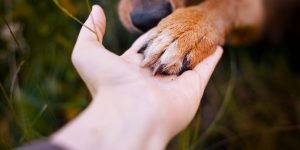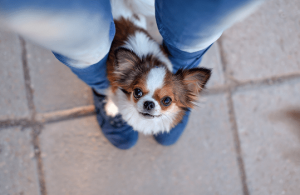Why Dogs and People Love Each Other So Much?
In this article, Holidays4Dogs looks at the interesting question of why dogs and people adore each other so much. We also ask – why do some dogs seem keener to bond with humans, than with other canines? Similarly, we consider why some people would rather hang out with their dogs than with their human friends. Ultimately, we look at the wider subject of why people love dogs and how that unique bond is created.
“I would rather be with my dog than with people!”
As any dog lover will surely agree, there are a lot of reasons why people love dogs. Perhaps, not so much when it comes to human relationships. How many dog lovers have admitted to preferring the company of their dog more than people?
There are many advantages to the friendship and bond one can have with a dog which, for many people, is superior to the relationship one has with fellow human beings.
and bond one can have with a dog which, for many people, is superior to the relationship one has with fellow human beings.
A dog, with unfaltering loyalty, is always there. Dogs are unequivocally non-judgmental and have no opinion on how much money you have, where you live, the job you have, or what car you drive.
A dog will never betray you, shun you, or bear a grudge and if you’re having a bad day, he will comfort you, empathise with you and be content to be with you for who you are.
Many would argue these are not always qualities found in human relationships.
However, while dogs might be the best friend of choice for many, dogs do help us to make new friends with other people, they can also help the socially isolated to get out and about, gain confidence and develop new social groups.
Dogs promote social cohesion.
Dogs are wonderful companions. It is therefore, unsurprising, pet owners have been shown in studies to be far less lonely than non-pet owners.
While this is true, it also known that dogs can help us to make social connections with other people. Many dog owners have made new friends, because of their mutual love for dogs.
There are also advantages to the creation of a bond from the dog’s perspective – they receive a great deal of safety and support from their two-legged caregivers. The idea that dogs are social creatures only within the confines of their own species may be true to a certain extent.
However, scientists the world over have broadly de-bunked this theory. As time goes on, we are learning many more things about how the behaviour of pet dogs when interacting with people, and there have been some very interesting studies on how dogs learn and understand.
Dogs are not wolves.
As we have learnt in other Holidays4Dogs articles, dogs are not wolves and there is now plenty of evidence to show that dogs do not behave the same as wolf packs – either captive, or in wild groups.
Wolves in captivity will will become agitated if separated from their wolf pack and seldom bond with their human caretakers – particularly if this involves being in unfamiliar territory. This is not true of domesticated dogs who very readily bond with their human caretakers.
Attachment levels towards humans.
Research on dogs has tested attachment levels between pairs of dogs that have lived together all their lives. During the experiment, each pair of dogs (8 dogs in total – aged 7-8 years), were separated for four hours.
The researchers removed one dog from the kennel and observed the second. None of the dogs left alone without their kennel mate showed any signs of anxiety as long as they were in their familiar environment.
The researchers then moved the dogs to an unfamiliar kennel. While stress hormones were recorded as increasing by 50% the dogs did not interact much with each other, or make any attempt to take comfort from one another.
Finally, the experiment put each dog into a strange kennel with the company of its caretaker. In each case, the dogs would seek comfort from the human by getting close and instigating petting. Each dog’s anxiety reduced after interaction with the person.
The conclusion reached was that the dogs appeared to have a much stronger bond with their human caretaker than they did with their kennel mate; even though they had lived with them all their lives.
Selective breeding and socialisation.
Undoubtedly, pet dogs have been selectively bred to live and work with humans for centuries. It is, therefore, not incomprehensible that some dogs prefer the company of people, over other dogs.
This may be even truer of specific dog breeds. Chihuahuas, for example, were specifically bred as companion dogs and living hot water bottles for ladies.
They had no need to run, or live in packs, or indeed to mix with dogs much at all. They have been selective bred as holdable companions, with few opportunities for natural behaviour.
It is little wonder then, that toy dogs like these have a reputation for being feisty and argumentative. Especially, with their own species – and frequently, with dogs three, or four, times their own size.
Nature and nurture.
Environment, experience and genetics are all relevant to how much better a dog responds to people, than to other dogs. Dogs bred specifically to work with humans are, perhaps, biased to bond with their human partners. Herding dogs like Border Collies, for example, typically lack sociability with unfamiliar dogs.
Socialisation of the dog through key development phases is also a contributing factor. A dog, lacking in social skills within their own species, may well prefer people over dogs for the rest of their lives.
Conclusion.
There are many complex reasons why people love dogs so much. Dogs are capable of providing purpose and meaning in people’s lives by lifting a person’s mood, providing companionship, or helping with physical tasks. They touch our hearts and highlight the human need for love and companionship.
They are an inspiration for our own unique abilities to love, nurture and care to come shining through. But it isn’t one sided. Dogs, too, gain a great deal of comfort and confidence from the people they live with in the human world.
While we may sometimes prefer the company of our pets instead of people, we should remember that a dog brings out the very best of our own human qualities – an essential element for a harmonious society.


